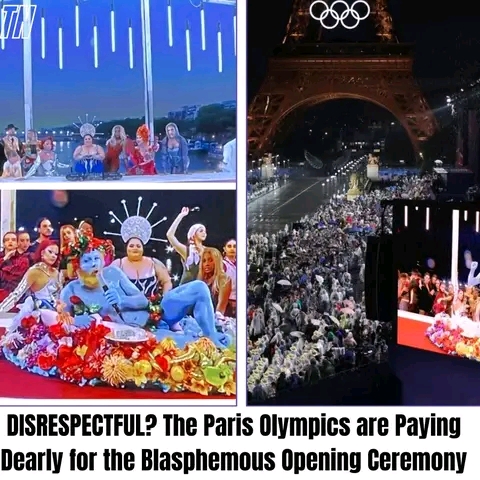BREAKING NEWS
Paris now has the lowest rated Olympic Game in modern history: “People want SPORTS, not BLASPHEMY”

The Paris Olympics have become a lightning rod for controversy, with reports circulating across the internet about the games losing both advertising revenue and public support after a blasphemous opening ceremony that allegedly mocked Jesus Christ and the Last Supper. While the credibility of these reports is questionable, their sensationalist headlines have nonetheless captivated many. As the fallout from this event continues to unfold, it raises important questions about the financial and cultural impacts on future Olympic Games, particularly the 2028 Los Angeles Olympics.
The Fallout from Paris
The controversial opening ceremony in Paris has been a focal point for criticism, with claims that it has led to significant financial losses and a decline in public support. Despite the lack of credible evidence to substantiate these claims, the perception alone has been enough to stir public outrage and provoke calls for boycotts. This situation underscores a broader cultural divide, where events perceived as politically or culturally provocative can lead to widespread backlash.
The immediate financial implications for the Paris Olympics are concerning. Reports suggest potential losses exceeding $300 million, attributed to both decreased advertising revenue and lower-than-expected ticket sales. The half-empty stands during events reflect a tangible manifestation of this discontent, signaling a broader issue of waning public interest and support.
The Broader Implications for Future Games
As we look ahead to the 2028 Los Angeles Olympics, the controversy surrounding the Paris Games prompts several critical questions. Will the backlash from Paris affect public perception and support for future Olympics? Can the Olympic Committee and host cities learn from these events to avoid similar pitfalls?
One of the key concerns is whether the cultural and political themes present in opening ceremonies and other aspects of the games will continue to provoke strong reactions. The notion of a “woke” dedication to a Greek god, as speculated by some, highlights the ongoing tension between traditional values and modern interpretations of cultural and historical elements. The challenge for future games will be to balance respect for diverse cultural expressions with sensitivity to varying public sentiments.
The Impact on Athletes
While boycotts and financial repercussions primarily affect the organizing committees and sponsors, the athletes are often caught in the crossfire. The Olympics represent a pinnacle of achievement for many athletes, offering a rare opportunity for global recognition and competition at the highest level. Punishing the Olympics by withdrawing support or calling for boycotts inadvertently punishes these athletes, many of whom have dedicated their lives to their sport.
This dilemma is particularly poignant for high-profile athletes like LeBron James and Brittney Griner, whose participation draws significant attention and support. The broader public and patriotic sentiments often come into play, as people grapple with the desire to uphold certain values while also supporting their national representatives in the games.
Seeking a Balanced Approach
Navigating this complex landscape requires a nuanced approach. The question, “What would Trump do?” (WWTD), invokes a particular political perspective, but the underlying issue transcends individual political figures. It speaks to the broader challenge of finding a path that respects diverse viewpoints while maintaining the integrity and inclusiveness of the Olympic Games.
To move forward constructively, it is crucial for organizers to engage with a wide range of stakeholders, including athletes, sponsors, and the general public. Transparent communication and a commitment to balancing cultural representation with sensitivity to public concerns can help rebuild trust and support for future games.
Conclusion
The controversy surrounding the Paris Olympics serves as a stark reminder of the delicate balance between cultural expression and public perception. As the world looks ahead to the 2028 Los Angeles Olympics, the lessons learned from Paris will be instrumental in shaping a more inclusive and widely supported event. Ultimately, the goal should be to celebrate the spirit of the Olympics, fostering unity and showcasing the remarkable talents of athletes from around the globe, while navigating the complex interplay of cultural and political values in a way that honors the diverse perspectives of all participants and spectators












